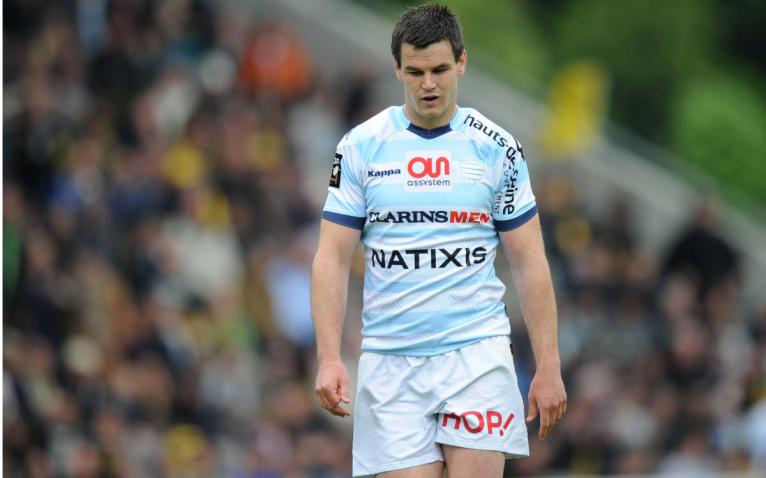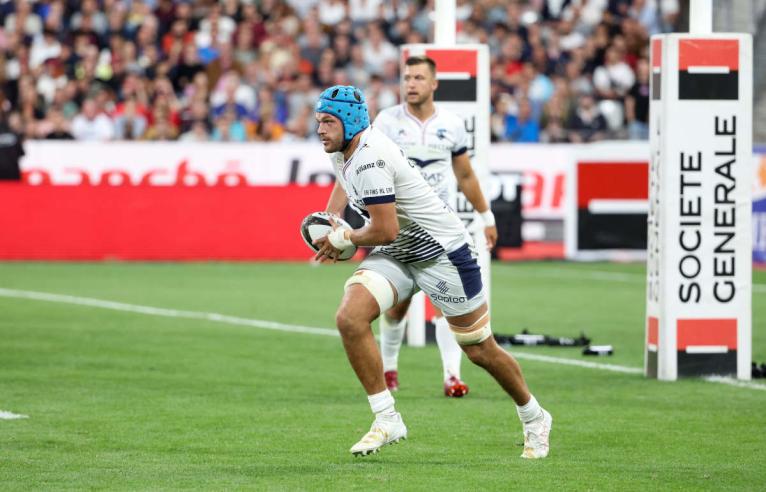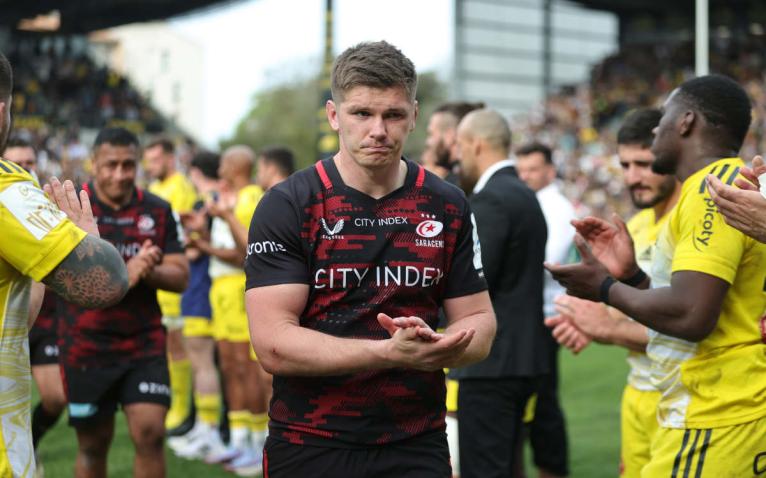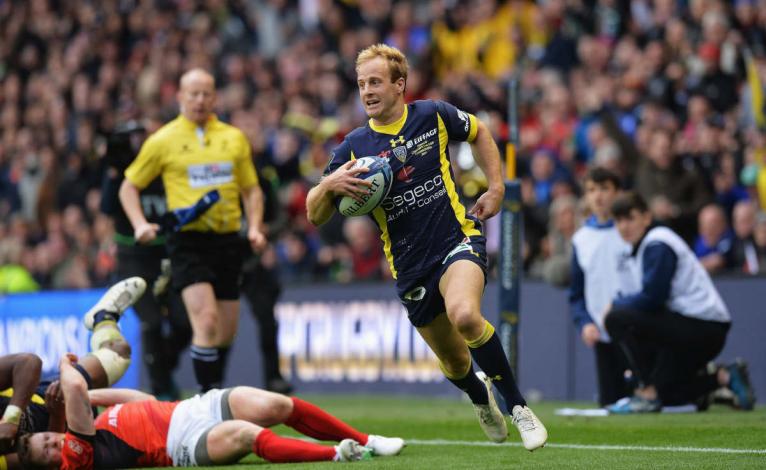A British newspaper suggested recently that English players must be dissuaded from joining a French club for the good of the national team. Pointing to the fact that England have won a grand total of six matches in the last three Six Nations championships, the [1] Daily Telegraph said that the last thing England coach Steve Borthwick needs is “seeing the likes of [Maro] Itoje being flogged every weekend in the French Top 14”.
As evidence of the danger faced by any foreign player who takes the Top 14 euro, the paper cited the case of Johnny Sexton. According to David Nucifora, Ireland’s performance director, Sexton returned from two seasons at Racing 92 ‘battered, bruised and out of form’. Leinster nurtured him back to health by restricting his game time to the bare minimum.
Sexton started 21 Top 14 and European matches in his first season at Racing (2013-14) and 14 in his second; in the last seven seasons at Leinster – not counting this season – the fly-half has started an average of nine URC and European matches.
There are two obvious counter arguments to the anxiety expressed by many in England about their top players being ‘flogged’ to death by the likes of Toulouse, Montpellier and Racing; the first is the form of the French team in the last couple of seasons. Their players didn’t look jaded as they strung together a 14-match winning streak, including a 2022 Six Nations Grand Slam. Last season the international Toulouse trio of Antoine Dupont, Romain Ntamack and Thomas Ramos started 19, 22 and 23 matches for their club. So far in 2022/23 Dupont has started 14, and we haven’t even got to the business end of the season.

It wasn’t being flogged that made Sexton’s two seasons in Paris a failure; it was more the fact he was temperamentally unsuited to his new environment. He was homesick from the start, and never acclimatised to French culture. Laurent Labit, the then Racing backs’ coach, admitted subsequently: ‘We never succeeded in finding a good way to function’.
The other counter argument is called Jonny Wilkinson. When he moved from Newcastle to Toulon in 2009 his career was in the balance. Four injury ravaged years left many wondering why the Cote d’Azur club had shelled out big bucks for the England fly-half.
Mon Dieu, did they get their money’s worth! In his first season Wilkinson started 22 domestic and European matches and in his second 24, in between jetting off to play for England in the Six Nations.
Clearly being flogged by the French never did Jonny’s game any harm. It helped that he made an effort to learn the language and adapt to the new way of life.
Wilkinson’s last season at Toulon was in 2013/14 (by which time he had retired from international rugby) when at the age of 34 he started a remarkable 27 of the club’s 32 matches as they clinched a Top 14 and Champions Cup Double. Clearly being flogged by the French never did Jonny’s game any harm. It helped that he made an effort to learn the language and adapt to the new way of life.
The same can be said of Nick Abendanon at Clermont, Iain Balshaw at Biarritz, James Hook at Perpignan, Carl Fearns at Lyon, Trevor Brennan at Toulouse and Gregor Townsend at Brive. They all enjoyed successful stints in France, as is Zach Mercer, who is something of a cult hero at Montpellier.
Last season the former Bath No 8 started 24 matches on his way to being named Midi Olympique’s Player of the Season, and Mercer has already racked up 22 this campaign, with two months of the season to play.

Hook moved from the Ospreys to Perpignan for three seasons in 2011 precisely to get more game time, reflecting subsequently: “For an outside-half it was good for me to play week in week out in high-pressure games…it’s given me the experience of playing in a different league and taken me out of my comfort zone, having to speak a different language and so on.”
Every Anglophone player who signs for a French club is leaving his comfort zone for an environment where many things are done differently. Fifteen years ago Brive went through a phase of signing Englishmen, including Steve Thompson, Andy Goode, Ben Cohen and Riki Flutey – but the only one who made a fist of his French experience was Jamie Noon. I interviewed the former Newcastle and England centre in 2013 shortly after he’d made the last of his 84 appearances for the club, and he told me the key to his successful four seasons at Brive: “I came with an open mind from the start,” he said. “I struggled for the first couple of months but whereas some of the [English] boys got stressed and annoyed by certain things, I just thought I might as well go the French way.”
The financial disparity between the Top 14 and the Premiership is only going to widen as French rugby reaps the benefit of hosting the 2023 World Cup
A decade ago French rugby lagged behind its British counterpart in terms of fitness and nutrition, but that gap has now been closed and most of the Top 14 clubs have training facilities that are superior to their Premiership rivals. That’s because the clubs have money, generated through bigger gates and particularly bigger broadcasting deals. In December 2020 BT Sport renewed the TV rights for a further three years for a total of £110m; three months later Canal Plus signed a new four year deal with the Top 14 that was worth approximately £98m a season.
The financial disparity between the Top 14 and the Premiership is only going to widen as French rugby reaps the benefit of hosting the 2023 World Cup. Consequently, in the years ahead the Top 14 will become to rugby what the English Premier League is to European football: the most lucrative, exciting, glamorous and competitive league where the big names want to play. The Premiership, on the other hand, will become rugby’s answer to French Football’s Ligue 1: a couple of decent clubs in an otherwise mediocre championship with attendances a fraction of those of the Top 14.

It would be an act of great self-harm were the RFU to insist that England’s finest stay put; let them play in France and test themselves each week against the world’s best players. Look at the French football team: they won the World Cup in 2018 and were the finalists in 2022. Of the 25 players in Qatar, only six played for Ligue 1 clubs. Evidently it hasn’t had an adverse effect on the French team. On the contrary, playing their football in England or Germany or Spain has improved them.
In all likelihood, a few of the Englishmen who have recently signed for French clubs won’t enjoy the experience. Others will thrive, as Nick Abendanon did when he left Bath for Clermont in 2014. The following year the full-back was named the European Player of the Year, and in 2017 he was part of the Clermont side that won the Top 14 title. Abendanon joined Vannes in the ProD2 in 2020 and although he retires at the end of this season he’ll be staying in France, as the skills coach at Bayonne.
I thought Bath was a rugby town but it’s not, certainly not compared to Clermont, Toulouse or Bayonne, where everyone talks about the game. If you’re playing well, people want to chat and it opens doors.
Nick Abendanon
He doesn’t believe English players coming to France will be ‘flogged’. “French rugby has changed a lot in recent years,” he says. “It’s become much more professional in terms of looking after players, nutrition and fitness. I would say I was better looked after at Clermont than I was in England.”
That in part was because Abendanon was one of Clermont’s crown jewels, and his advice to the English players coming to France next season is simple: “It’s important to make a good first impression,” he says. “The French boys in the squad will respect you and it makes life easier with the locals.
“The summer before joining Clermont I trained really hard because I wanted to be in the best shape, and it paid off. I hit the ground running and never looked back. I thought Bath was a rugby town but it’s not, certainly not compared to Clermont, Toulouse or Bayonne, where everyone talks about the game. If you’re playing well, people want to chat and it opens doors.”

The fervour from the fans is what makes the Top14 unique, says Abendanon, and the most exciting league to play in. “In the Top 14 it feels like every game is so much bigger than back home,” he explains. “The stadiums, the crowds, the noise, everything. And it really motivates you because we are competitive animals and in that environment you want to be the best you can, to show the French that you deserve to be playing each week.”
Englishmen should be allowed to represent their country regardless of where they play their club rugby. If they make the most of the opportunity it would improve them as players, and by extension improve the national squad. Performance before parochialism.


Look at the issues England had with Willis this 6N, he missed a match and was playing for Toulouse in the fallow weeks. Now imagine that multiplied.
OMFG, can we stop with this French propaganda? I'm sick of this barrage of articles suggesting that Rugby Unions should destroy their domestic competitions. A move like this would destroy pro club Rugby in England, just as it did in Australia, Wales and South Africa while they were "competing" in Super Rugby.
Take all star power out of the Premiership and there won't be clubs for young players to sign up with, they'll at best languish in 2nd tier French Rugby. Same with the suggestions for New Zealand to select has been players from overseas, it would only serve to kill domestic Rugby in New Zealand.
So your arguments for letting players move outside of the prem and still play for England are:
1. “The form of the French team” - a team whose players are all based in their domestic league.
2. “Wilkinson” - who retired 10 years ago.
I don’t agree. We need to keep English players in England. It’s beneficial to the England team short term because it gives Borthwick more time with the players. But more importantly, it’s vital for the club game in the long term. We don’t want a second rate league.
Wake up, we already have a second rate league. For all the reasons above and then some.
Clubs are dropping like flies with more on the way.
The prem are huge cake eaters asking a completely separate body for money (RFU) and then expecting zero give back (more player control).
They have been premier league wannabies for years and only now realising how far they are away.
Let the boys go and earn decent money and play against better players, it can only improve things. The prem is a sinking ship that is full of self interest and puts themself above the national team on the pyramid. The chickens are finally coming home to roost and its painfully satisfying.